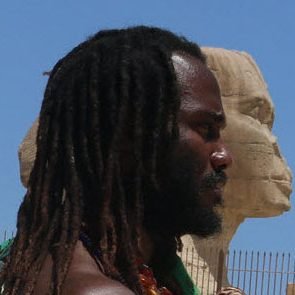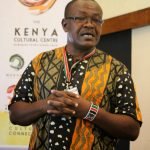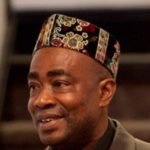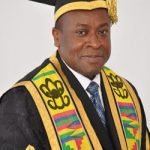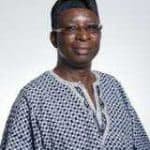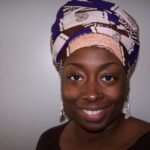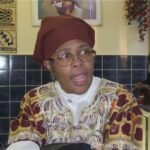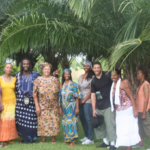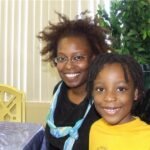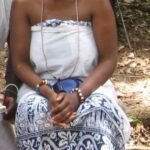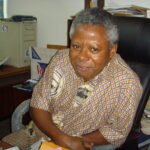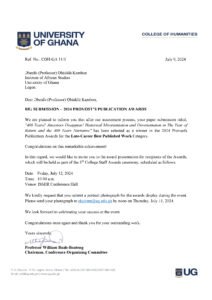Recent Posts
- THE CONSTRUCTION OF BLACK CIVILIZATION VOLUME I
- Ghana Citizenship Process for Historic African Diasporans: Suspension Notice, Community Response, and the Path Forward
- D.O.O.R. Ignites Diaspora Summit 2025
- Ɔbenfo (Prof.) Ọbádélé Bakari Kambon Invited as Panelist for Ghana’s Diaspora Summit 2025
- Ɔbenfo Ọbádélé Bakari Kambon Appointed UNIA-ACL Ambassador to Ghana
Testimonials
UNESCO Testimonial
On Dr. Kambon’s PhD Thesis
“A major contribution of the dissertation is the detailed discussion and exemplification of issues relating to nominalization of SVCs. This is the first attempt at such a detailed discussion and exemplification and the candidate deserves commendation. His categorizations are original as is his attention to scholarly detail and to showing the relationship between and among the three major Akan dialects. One could conveniently argue that this is one of the strongest points of the dissertation.
Very little has been done on Akan nominalization in general and little to nothing on SVC nominalization in particular, so this study is a trailblazer or a path-finder! Syntacticians and semanticists will cite this work and continue with the discussion and issues it raises for the next couple of decades. I am impressed with the details and both the candidate and his advisors must be commended for the high degree of systematicity employed in the synthesis and analyses done in the study.”
On Dr. Kambon’s Award-Winning Ph.D. Thesis
Throughout his doctoral research, Dr. Kambon displayed an amazing grasp of functional theoretical constructs and manifested very impressive analytical skills. In the last two years, three of my doctoral students have completed their studies and, among them, Dr. Kambon towers above all in terms of his dedication, enthusiasm, intellectual capabilities, and his rate of work. Indeed, this is affirmed by his being awarded the University-wide Vice-Chancellor’s award for best PhD thesis in the Humanities for 2012-2013. I have known Dr. Kambon long enough to appreciate his personal discipline and dedication to work.
Professor Augustine H. Asaah
Professor, Department of French
School of Languages
College of Humanities
University of Ghana
Legon, Accra
Ghana
Prof. Kwasi Konadu
Mo ne adwuma o! Kwame (Obadele), you have done well and your work with the Abibitumikasa.com and AKALI is exceptional. My advanced study of the Akan (Twi) language has grown much under your direction, and my studies have been enriched by your deep knowledge of the language and culture, competent yet flexible and accessible style of teaching, as well as a rare but greatly welcomed commitment which you demonstrate to learners. Our coverage of Akan proverbs, drum texts, stories, and poetry has reminded me that to study a language is to study a civilization, and I appreciate that.
Though I will certainly continue to study Akan (Twi), and Yoruba a little later, I encourage those of our folks with internet access or who reside in Chicago to check out AKALI and its resources! Twi kasa no te sɛ nkwan-dɛ pa berɛ a obi nim mmɛ binom. Ɛyɛ me sɛ meda onua Kwame ase ɛfiri sɛ abɛdwaa pɛ nkwa a, na ɛbata odum. Yoo, yɛbɛdi nkɔmmɔ akyire yi ara!
Nana Kwabenata Ababio Ɛtuɔhene
Abusuafoɔ mekyea mo o,
Me din de Nana Kwabenata Ababio Ɛtuɔhene. 20 afei deɛ mete Asanteman mu o.
Ɛyɛ me anigyeɛ sɛ metumi frɛ Ɔbenfoɔ (Dr.) Kambon me Twi kasa ɔkyerɛkyerɛfoɔ ɛnna m’adamfo nso. M’ani agye ne ho pa ara ɛfiri sɛ wayɛ baabi (Abibitumi Kasa) a, ewiase yi mu, ɛno nko ara na ɛkyerɛ yɛn abibifoɔ kasa a ama yɛasan aba yɛn akyi.
Abibitumi Kasa nyɛ baabi a wobɛsua abibifoɔ kasa kɛkɛ. Mmom, wɔ Abibitumi Kasa, wobɛhyɛ aseɛ anante wo Sankɔfa kwan so na, afei, wobɛdwene te sɛ w’abibifoɔ nananom. Wei na ɛma Abibitumi Kasa da mu fua a ɛnte sɛ fidie ntentan ahwɛeɛ nyinaa a aka ɛfiri sɛ ɛnyɛ kasa nko ara na wobɛsua wɔ ha.
Ɛnam Dr. Kambon nti, metumi bɔ bra papa wɔ Asanteman mu. Mewɔ nnamfoɔ bebree a me ne wɔn ka Twi kasa no da biara. Sɛ mekɔ dwa mu a, menni haw koraa ɛfiri sɛ metumi tɔ biribiara a mepɛ na afei, menyera da wɔ Ghana ɛfiri sɛ menim sɛnea metumi bisa obi kwan a mɛfa so akɔ me fie no biom.
Mekamfo Dr. Kambon ɛde aka ne ho asɛmpa na mebɔ mpaeɛ sɛ n’adwuma no bɛkɔ soɔ wɔ Abibitumi Kasa akɔsi awieeɛ.
Ɔbenfo Asa G. Hilliard (The Late Nana Baffour Amankwaatia II)
One of our youngest master teachers, Obadele Kambon, is now offering Twi and Yoruba on-line! Here is an opportunity for every African who does not know one to learn an African language, or to learn another one if one is known already.
Sankofa calls. Among all of the things that we learn, we must master the linguistic and cultural tools to go back and get what we have left behind, as a major step to go forward.
Seba Mawiyah and Seba Kamau Kambon, parents of Baba Obadele have given us a great gift, a son who is pleasing to our ancestors. Ase!
Afia Keedy
[Intro Akan (Twi) Live Streaming Online]
Maaha. These are just a few things learning Twi at Abibitumi Kasa has done for me.
Baako- It increases your brain power-Having to think, comprehend, and respond in logical manner in another language causes you to stretch the limits of your mind.
Mmienu- It adds to your own personal development – Being able to learn another language gives you a deeper sense of achievement. It gives you a cursory glance of what your mind is capable of doing.
Mmiɛnsa- It gives us another means to communicate without relying on YT.
Ɛnan- It bridges gaps amongst Africans. – This is the most important reason for me. While I was visiting Ghana, I used as much Twi as I was capable of. When I spoke to my brothers and sisters in Twi, I was regarded with respect for taking the time to learn a mother tongue and for trying to use it. This feeling of acceptance by my Ghanaian brothers and sisters goes way beyond anything I have ever experienced. It also tore down the barrier of relying on YT language to communicate.
And as a side note, I was commended for the tonation used while speaking. Everyone thought I had learned Twi from a native speaker. When I told them I learned from an African in the u.s. through Abibitumikasa, they were shocked. So I am a personal witness on the importance of learning our languages and the thorough instruction provided by Abibitumikasa.
If you are serious about being an African and your aim is to help Africans throughout the Diaspora, it would behoove us all to learn our own languages.
I will continue studying Twi and hope to learn other languages as well. I challenge others to do the same.
Meda ase pa
Neico Sa-Ra
[Intro Akan (Twi) Live Streaming Online]
I am Neico Sa-Ra, Mother, Wife, Daughter, Sister, Teacher, Warrior: Nkɔso! My interest in learning Twi originally stemmed from a comment Okomfo Nana Kweku Sakyi made. I wanted to study the Akan Spiritual System, specifically from the Bono Tekyiman region and while in a study group with Nana Sakyi he stressed that we can not really know the spiritual tradition unless we know the language.
This comment from Nana spoke to the importance of learning the language because it is a reflection of the culture and the culture is a reflection of the spiritual tradition. My first Twi class was with Ɔkyerɛkyerɛfoɔ Kwame Obadele and he continues to be the voice of clarity in not only the language but in the culture as well. Abibitumi Kasa has guided me on my path of Sankɔfa and for that I am grateful. Understand that Obadele’s teachings are special not only because of the emphasis on clarity of speech and intonations but also for the warrior spirit that is behind each and every lesson.
Today a Ghanaian who viewed just the proverb page reported that she learned not only proverbs that she didn’t know but words that she had lost in her amerikkkanization process. If Abibitumi Kasa can do this and hook the sista up at just a glance just think of what it can do for you….., Abibitumi Kasa is HOT all day long, if you haven’t already you should check us out!!
Terry Johnson
[Intro Akan (Twi) and Yorùbá Chicago]
I have taken Ọbádélé‘s Yoruba and Twi classes. I am amazed by his knowledge of African languages, linguistics, African culture, African history, and African sprituality. I am amazed at how Africans from home react to Ọbádélé speaking Yorùbá, Twi, KiKongo, or Wolof. Reactions I have witnessed from Africans are: “ah”, “What is this”, “I can’t believe this”, “His parents must be from Africa”, “How does he do this”, “Why”, “This can not be so”, “This is the real language”, and more. When I showed a Yorùbá woman my syllabi from Ọbádélé’s Yorùbá class, she said, “I am afraid of this”, “Bring him (Ọbádélé) here”. You must, if you haven’t, experience Ọbádélé talking to Africans from home in African languages. It’s a real treat. It will blow your mind. It will show you how great this little brother is. He is going to be big. WATCH!
Ifálọlá Ṣàngóyẹmí
[Intro and Intermediate Yorùbá Live Streaming Online]
Orúkọ mi ni Ifálọlá Ṣàngóyẹmí. I have taken both Intensive Yoruba I and II with Dr. Obadele Kambon. I became a member of Abibitumi Kasa in June 2013. Shortly after, I decided to embark on the path to learn the language of my ancestors.
I highly recommend this class for anyone looking to master the language in a short amount of time. The class sessions are extremely interactive and Dr. Kambon is an instructor who knows how to make his students feel both comfortable and confident. He is full of both knowledge and jokes. 🙂 Class is never a bore and you’ll always get a little more than you came for. In addition to the standard curriculum, Dr. Kambon would share songs, proverbs and more.
I am in full support of him and the entire Abibitumi Kasa team.
Ojúọlápé Ẹfúnyalé
[Intro through Intermediate Yorùbá Live Streaming Online]
I discovered Abibitumikasa at the Sankɔfa Conference in Washington, DC in 2006 via a flyer. When I got back home and analyzed everything in my tote bag I looked at this flyer and thought wow, this is exactly what I have been looking for. You see I was ready to study the Yorùbá language as an Awo of the Ifá Spiritual System but I wanted to learn the language the way my ancestors spoke it so I could know their paradigm, our paradigm, before we understood the world and everything in it with English ears and an English tongue. I signed up for the next Yoruba class that was being taught that Spring. I never looked back.
Since then I have taken 3 Yorùbá classes with Abibitumikasa and it has been a truly enlightening experience. Olùkọ́ Ọbádélé teaches Yorùbá (and I’m sure all other Afrikan languages) in a way that gets to the heart of the speech. What I love about his teaching style is that he does not give loose translations of the words into English. He breaks the words down and unties them so that we will know exactly what Afrikans thought of this object, or of that concept. Learning an Afrikan language on Abibitumikasa.com has been an integral part of my Re-Afrikanization process. A process of re-discovery, re-definition, and re-vitalization of words that are uniquely ours. I am finally at a place where I am comfortable with the language. I have retained enough that I enthusiastically untie Yoruba words when I hear them to learn what they really mean. I refer to the way my Yoruba ancestors thought when I am trying to wrap my mind around a concept. Olùkọ́ Ọbádélé has always been very patient with me in my mastery of the tonal Yorùbá language (I think I finally got it). Language classes at Abibitumikasa is an experience like no other…trust me
Patricia Beck (Akosua)
[Intro Twi Chicago]
(Dear) Ɔkyerɛkyerɛfo Obadele Kwame
Mekyea wo!
Please forgive my haste, and delay, in applauding your work at Abibitumikasa, including your courage and tenacity to construct a Twi Language curriculum, and to making it available in both classroom and on-line settings. As I become more proficient with Twi, I shall also write in Twi.
I attended the 8-week introductory course at Betty Shabazz International School in Chicago this past Fall, and was most impressed with the experience. I refer to it as ‘an experience’ because the course presentation went beyond the organized and familar “schoolroom” format of syllablus, blackboard, paper-pencil and note-taking, and technical instruction in which, by the way, your background in linguistics and your proficiency in Twi were most impressive! The ongoing infusion of the cultural dynamics of Akan Culture: the music, presented as background throughout instruction; the presentation of a variety of authentic African musical instruments; the constant interjection of Akan sayings to explain “everything;” the insistence of Twi usage in our interactions with you and with each other; your very lively and animated storytelling; the respect you afforded us, the elders, always; and the active inclusion of the children on our classmates (including homework assignments), all triggered a sense of ‘belongedness’ that gave us the feel of “A Village” environment. For me, this engagement was priceless! I learned a lot!
Most memorable for me, however, were your continuous phone calls to me (and, also from classmate, Ama, aka Ruqayya) during my class absences and attempts to become a “dropout!” Because of the quiet and humble tenacity of you both, I completed the course and participated in the very fun (and funny) class play held at the Palace Gate Restaurant (Ghanaian.), also attended by our class, the Yoruba class and friends. This event, with sights, sounds and food of Ghana, and the entire class experience leaves my heart hopeful of the rise, again, of Africa!
I am on my way to South Africa, in five days, and cannot join you in the current class offering, nor can I travel with you to Ghana in January. But look for me in February when you offer the introductory class, again. I need it, and will be there. Once I am there, remember that I require support to see it through. I expect it!
Bio…Meda ase, pa!
Akosua
aka Student Patricia Beck
ps…not responsible for Twi misspellings or misuse, yet!
Ìyá Omitádé Ifátósìn
[Intro Yorùbá Online through Advanced Student Yorùbá Ghana]
The Yorùbá language classes are so valuable that I have encouraged members of our Ilé to take the class. Everyone who has taken a class has benefited greatly. Not only do you learn the vocabulary and the correct pronouciation of the words but you also learn how the language supports appropriate protocol, respect for Elders and respect for African Traditional Religion.
Ẹ ṣé Olùkọ́ Ọbádélé for offering these teachings.
Afua Brakwa
[Intro Akan (Twi) Chicago]
Brother Obadele’s Twi class was awesome! As a participant, this class helped me to retune my Afrikan tongue. I enjoyed the many proverbs and songs we learned throughout the class. As a mother and wife I can share what I’ve learned with my family, as a teacher I can share what I’ve learned with my students and as a cultural activist I am happy to share what I’ve learned with our community.
MO NE KASA Brother Obadele! We appreciate the gifts and talents you have brought to the world!
I just had to share this with you. I haven’t been to your site in a while and today I remembered an article that you posted on your site that I wanted to reread and I saw what you have done with your site! In my best Chicago vernacular I just got to say DAMN Obadele your website is COLD!
I am REALLY big on presentation… brother your site is awesome! I love the presentation! Your website presents the idea that SERIOUS Afrikans have come together to share their knowledge and wisdom.
Anyway, just wanted to share… hope all is well in Ghana!
Ama Ruqayyah Albakri-Polk
[Intro Twi Chicago and Intro Yorùbá Online]
Absolutely Blacktastic!!!
When I started the class I did not have a strong language background so I wasn’t sure what my level of success would be. I have actually amazed myself. I took the online beginning and intermediate Twi class. I also attended the beginning class in Chicago with my 7-year old nephew and 11-year old niece who enjoyed the class immensely. Obadele’s Twi class was exciting, engaging and encouraging. Learning conversational Twi with Obadele was nothing like any other language class I had been exposed to. Our class had a flow of instruction that was entirely Afrikan and encouraged me to think outside of my typical perception of “traditional” learning and instruction. Among many other things, I learned common greetings, sentence construction, proverbs, history, cultural facts, and traditional spiritual beliefs. I also learned how all of these elements helped to shape the Twi language. Obadele accomplishes this through his depth of knowledge of this language and many other Afrikan languages. Nowhere in the English-speaking world can you match his wonderful language instruction. I encourage anyone who has even the smallest level of interest in one of the language classes to step forward wherever you are in the world and take one of the classes.
Our beginning Twi class along with the beginning Yoruba class had the opportunity to perform our final presentation for friends and family in the presences of local Twi and Yoruba speakers. They were impressed with our language skills and how we were reclaiming our Afrikan history through learning our Afrikan languages.
I have had the opportunity to see Obadele speak to Ghanaian Twi-speakers who could not even match his depth of the language. He was able to speak in ways that were not typical to local speakers today, using phrases and proverbs that are not even today being widely passed down on the continent. One beautiful Ghanaian woman commented that she never even spoke some of the words that he used; she had only heard of such use of the language and never even used the language that way herself, so even on the continent his level of knowledge and skill is difficult to match.
Obadele has devoted his life to genuinely learning of his people and their traditions and now he is helping us to reclaim our culture for ourselves. Thank you to all of the Beautiful Afrikans that I have been blessed to meet through taking these classes and thank you Obadele for your devotion to us. I am taking the advanced class this month and next time I promise to write in Twi.
Nana Abenaa Baakan
[Intro Akan (Twi) Live Streaming Online]
Meda ase Ɔkyeame Kwame, I give praises to you for dedication to teaching us Abibifoɔ our true language. This class has been a true blessing for me. I found the format very structured yet engaging. I not only learned a language, I added to my cultural understanding of who I am as an African woman. This needs to be mandatory for every one! I look forward to taking my other classes with you. Stay strong and joyful. Nana A
Ọyátólú Ọyápèmí
[Intro Yorùbá Chicago]
Ṣé àlàáfíà ni?
I attended Obadele’s Yorùbá classes at Betty Shabazz School early in 2006. Brother Ọbádélé is an enthusiastic lover of African language. His teaching style is personable and thorough. I would highly recommend the classes to those interested in learning the Yorùbá language. Even though I didn’t take his Twi class, I would recommend the Twi class also because the Twi students raved about him as a teacher as well.
Dr. Mawiyah Kambon (Nana Efia Nsia Asantewaa Mawiyah Kambon)
[Intro and Intermediate Akan (Twi) Online]
I have been blessed to be able to participate in Obadele Kwame’s online Twi classes. Developing the ear to receive the intonations has been a welcomed challenge. The dialogue exercises have truly helped with this process. Obadele’s patience and generosity is a part of his many gifts. May Onyame continue to guide his path and may we all continue to receive the energies sent from our Nananom Nsamanfo though this work. I will definitely be taking the intermediate classes this fall and encourage everyone to reclaim our heritage and sign up for a course. Meda wo ase Ɔkyerɛkyerɛfo Kwame.
Cera Dione Ridley
[Intro Yorùbá Live Streaming Online]
I am so very glad that I took the Intro to Yoruba language course. Not only did I get a good starting foundation for carrying on a conversation in Yoruba, but I also received knowledge about the culture. Obadele is an incredible instructor. He is very patient, knowledgeable, and funny. I would and have recommended this course to my friends and hope they too will take advantage of such a resourceful website and learning opportunity.
Anonymous peer review #1 (For application to position of Associate Professor)
“Dr Kambon leaves no one in doubt about the depth and breadth of his knowledge. The quality of his scholarship is breath-taking.”
– Anonymous peer review (For application to position of Associate Professor)
Anonymous Peer Review #2 (for promotion to Associate Professor)
It has been a privilege reviewing the scholarly works and professional activities of Dr. Obadele Kambon for promotion to the rank of Associate Professor. […] An established Ghanaian linguist on Akan morpho-syntax and Yoruba language and literature as well as Swahili proverbs, Dr. Kambon’s work on ‘Akan serial verb nominalization,’ ‘Akan causative constructions,’ ‘Akan Ananse’ and Yoruba Ijapa story and philosophical renditions, among others, place him at the echelon of top notch Africanist linguists and critical discourse analysts. Note that these works are published in the most important journals and publishing houses (i.e., by publishers) of African and Pan-African orientation. […] Thus, it goes without saying that Dr. Kambon’s works contribute greatly and considerably to our understanding of language, general linguistics, African Diaspora Studies, and Ghana’s socio-educational structure. […] To conclude, Dr. Kambon has exceeded the bar set by the University of Ghana (and any academic/professional body of similar standing), for promotion to the rank of Associate Professor. His published works and professional activities are of significant intellectual import, political brimstone (at times), and of high excellent reputation. […] Thus, I appreciate and respect Dr. Kambon’s scholarship and I recommend and most strongly support his promotion case.
– Anonymous Peer Review #2 (for promotion to Associate Professor)
[pdf-embedder url="https://obadelekambon.com/wp-content/uploads/2023/05/20230515_Reviewer-2.pdf" title="20230515_Reviewer #2"]